Working Papers
For submission of articles or Working Papers to CEsA, please send an email to:
comunicacao@cesa.iseg.ulisboa.pt
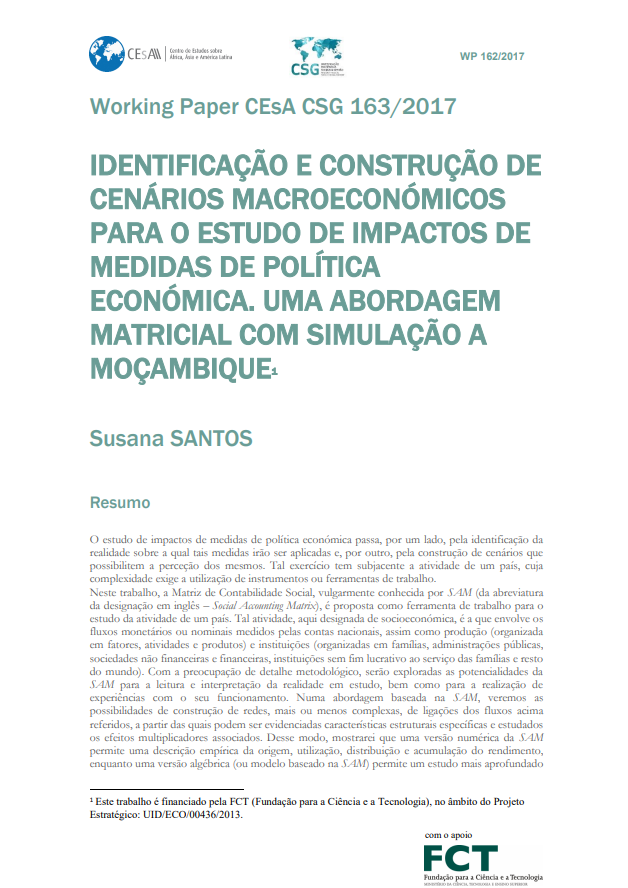
Working Paper 163/2017: Identificação e Construção de Cenários Macroeconómicos para o Estudo de Impactos de Medidas de Política Económica. Uma abordagem matricial com simulação a Moçambique
Abstract:
The study of the impacts of economic policy measures involves, on the one hand, the identification of the reality on which such measures will be applied and, on the other hand, the construction of scenarios that allow their perception. This exercise is based on the activity of a country, whose complexity requires the use of instruments or work tools. Identificação e Construção de Cenários Macroeconómicos para o Estudo de Impactos de Medidas de Política Económica. Uma abordagem matricial com simulação a Moçambique, the Social Accounting Matrix, commonly known as SAM (from the abbreviation of the name in English – Social Accounting Matrix), is proposed as a working tool for the study of the activity of a country. Such activity, here designated as socio-economic, involves monetary or nominal flows measured by national accounts, as well as production (organized into factors, activities and products) and institutions (organized into households, public administrations, non-financial and financial corporations, non-profit institutions serving families and the rest of the world). With a concern for methodological detail, the potential of SAM will be explored for the reading and interpretation of the reality under study, as well as for carrying out experiments with its operation. In an approach based on SAM, we will see the possibilities of building networks, more or less complex, of connections of the flows mentioned above, from which specific structural characteristics can be highlighted and the associated multiplier effects studied. In this way, I will show that a numerical version of the SAM allows an empirical description of the origin, use, distribution and accumulation of income, while an algebraic version (or model based on the SAM) allows for a more in-depth study of the multiplier effects (or impacts) associated with changes in these flows, caused by the adoption of policy measures, for example. I will exemplify such potentialities of SAM, giving special attention to the functional and institutional distribution of income, through the construction and analysis of two scenarios involving changes in the remuneration of production factors and in the income of institutions. Such an application will allow the identification of the relevant role of production factor accounts (from SAM), as they establish the link between income generation and the corresponding distribution and use. I will also emphasize the importance of a matrix approach in the identification and construction of macroeconomic scenarios in the study of impacts of economic policy measures, highlighting the complementary details that an InputOutput Matrix (IOM) can add. An application to the case of Mozambique in 2015 will accompany the presentation. In this application we will often talk about simulation due to the unavailability of information regarding all the flows worked.
Quotation:
Santos, Susana (2017). “Identificação e construção de cenários macroeconómicos para o estudo de impactos de medidas de política económica. Uma abordagem matricial com simulação a Moçambique”. Instituto Superior de Economia e Gestão – CEsA/ CSG – Documentos de Trabalho nº 163/2017.
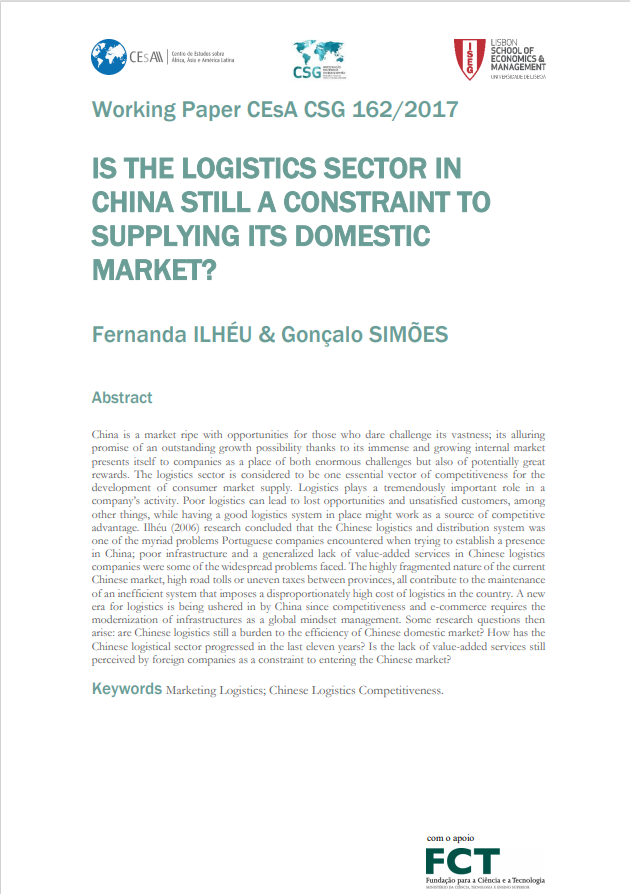
Working Paper 162/2017: Is the Logistics Sector in China Still a Constraint to Supplying its Domestic Market?
Abstract:
China is a market ripe with opportunities for those who dare challenge its vastness; its alluring promise of an outstanding growth possibility thanks to its immense and growing internal market presents itself to companies as a place of both enormous challenges but also of potentially great rewards. The logistics sector is considered to be one essential vector of competitiveness for the development of consumer market supply. Logistics plays a tremendously important role in a company’s activity. Poor logistics can lead to lost opportunities and unsatisfied customers, among other things, while having a good logistics system in place might work as a source of competitive advantage. In Is the Logistics Sector in China Still a Constraint to Supplying its Domestic Market? we continue the Ilhéu (2006) research that concluded that the Chinese logistics and distribution system was one of the myriad problems Portuguese companies encountered when trying to establish a presence in China; poor infrastructure and a generalized lack of value-added services in Chinese logistics companies were some of the widespread problems faced. The highly fragmented nature of the current Chinese market, high road tolls or uneven taxes between provinces, all contribute to the maintenance of an inefficient system that imposes a disproportionately high cost of logistics in the country. A new era for logistics is being ushered in by China since competitiveness and e-commerce requires the modernization of infrastructures as a global mindset management. Some research questions then arise: are Chinese logistics still a burden to the efficiency of Chinese domestic market? How has the Chinese logistical sector progressed in the last eleven years? Is the lack of value-added services still perceived by foreign companies as a constraint to entering the Chinese market?
Quotation:
Ilhéu, Fernanda e Gonçalo Simões (2017). “Is the Logistics Sector in China Still a Constraint to Supplying its Domestic Market?”. Instituto Superior de Economia e Gestão – CEsA/ CSG – Documentos de Trabalho nº 162/2017
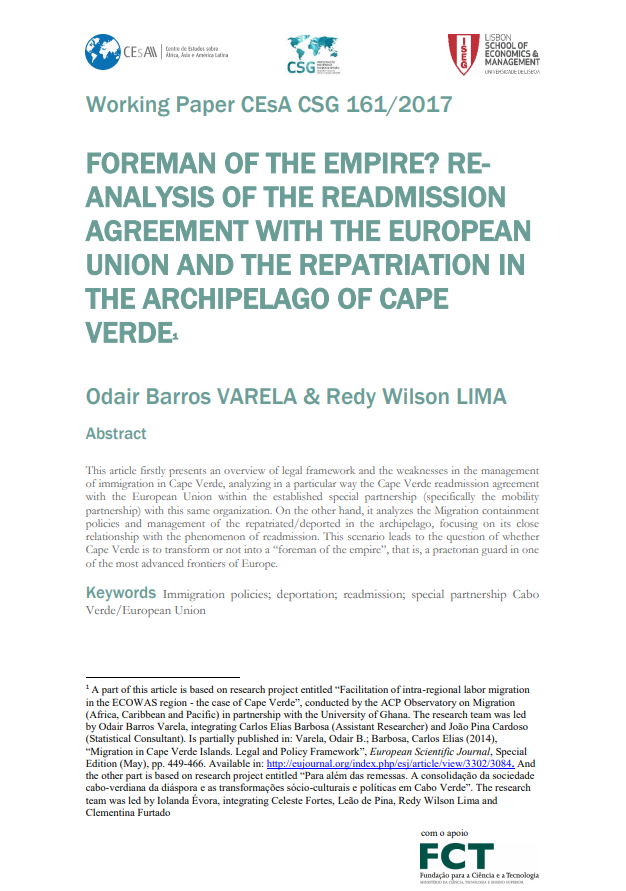
Working Paper 161/2017: Foreman of the Empire? Re-analysis of the readmission agreement with the European Union and the repatriation in the archipelago of Cape Verde
Abstract:
This article firstly presents an overview of legal framework and the weaknesses in the management of immigration in Cape Verde, analyzing in a particular way the Cape Verde readmission agreement with the European Union within the established special partnership (specifically the mobility partnership) with this same organization. On the other hand, it analyzes the Migration containment policies and management of the repatriated/deported in the archipelago, focusing on its close relationship with the phenomenon of readmission. This scenario leads to the question of whether Cape Verde is to transform or not into a “foreman of the empire”, that is, a praetorian guard in one of the most advanced frontiers of Europe. Trying to understand the complexity of migration to Cape Verde Island, one should also highlight the historical importance of links on the mobility of people, which played a key role in disseminating information and contacts between the pre-colonial societies. It should also refer to the implications of European colonial process in migration dynamics in the African continent, with the delineation of borders, through the recruitment of work force, or by using strategies for planning political and administrative control of the populations.
Quotation:
Varela, Odair Barros e Redy Wilson Lima (2017). “Foreman of the Empire? Re-analysis of the readmission agreement with the European Union and the repatriation in the archipelago of Cape Verde”. Instituto Superior de Economia e Gestão – CEsA/CSG – Documentos de Trabalho nº 161/2017.
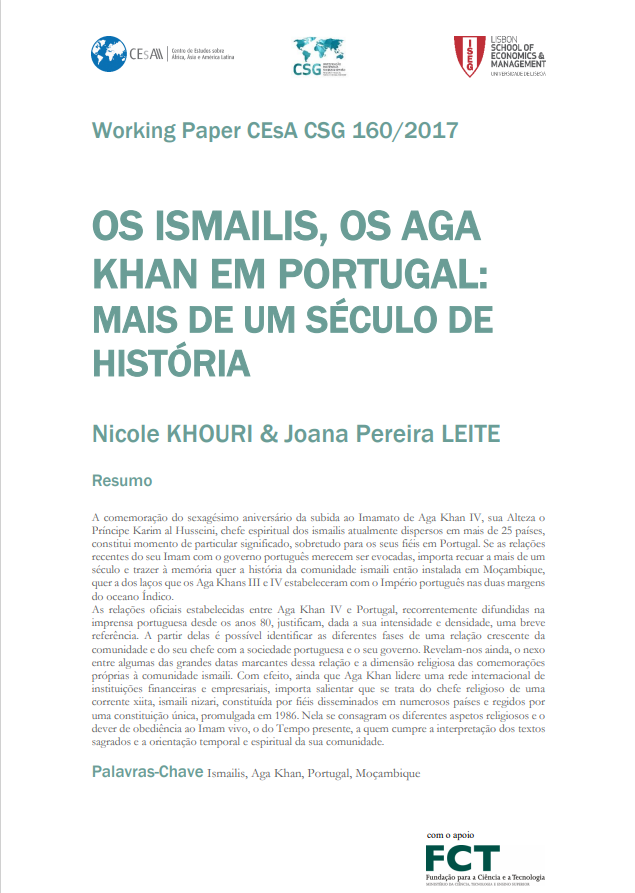
Working Paper 160/2017: Os Ismailis, os Aga Khan em Portugal: mais de um século de história
Abstract:
The commemoration of the sixtieth anniversary of the ascent to the Imamate of Aga Khan IV, His Highness Prince Karim al Husseini, spiritual leader of the Ismailis currently dispersed in more than 25 countries, is a moment of particular significance, especially for his faithful in Portugal. If your Imam’s recent relations with the Portuguese government are worth mentioning, it is important to go back more than a century and recall both the history of the Ismaili community then settled in Mozambique and the ties that the Aga Khans III and IV established with the Portuguese Empire on both sides of the Indian Ocean. In Os Ismailis, os Aga Khan em Portugal: mais de um século de história we study ho the official relations established between the Aga Khan IV and Portugal, recurrently disseminated in the Portuguese press since the 1980s, justify, given their intensity and density, a brief reference. From them it is possible to identify the different phases of a growing relationship between the community and its leader with Portuguese society and its government. They also reveal to us the nexus between some of the great milestones of this relationship and the religious dimension of the commemorations proper to the Ismaili community. Indeed, even though the Aga Khan leads an international network of financial and business institutions, it is important to note that he is the religious head of a Shia current, Ismaili Nizari, made up of believers spread across numerous countries and governed by a single constitution, promulgated in 1986. It enshrines the different religious aspects and the duty of obedience to the living Imam, that of the present time, who is responsible for the interpretation of the sacred texts and the temporal and spiritual orientation of his community.
Quotation:
Khouri, Nicole e Joana Pereira Leite (2017). “Os Ismailis, os Aga Khan em Portugal: mais de um século de história”. Instituto Superior de Economia e Gestão – CEsA/ CSG – Documentos de Trabalho nº 160/2017.
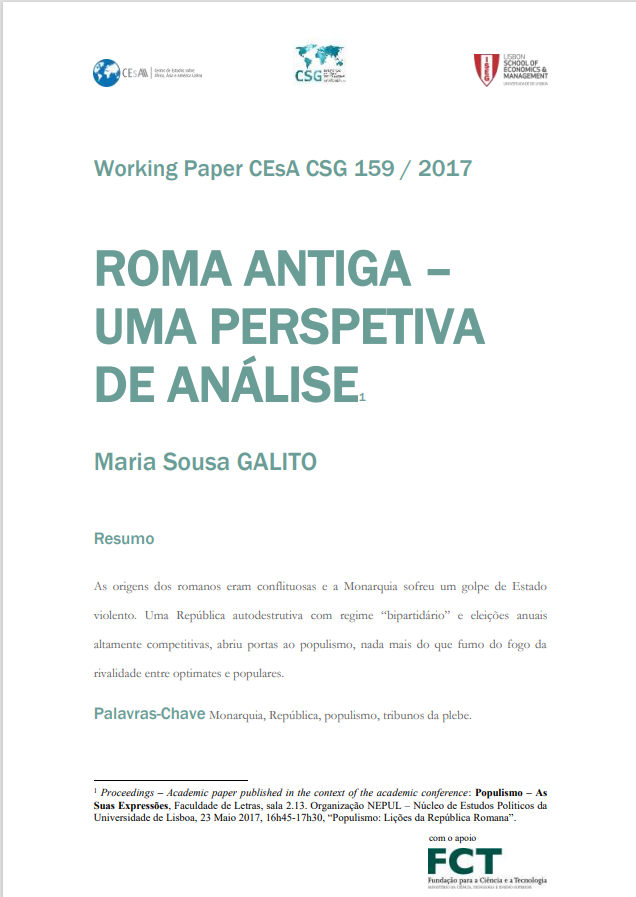
Working Paper 159/2017: Roma antiga: uma perspetiva de análise
Abstract:
The origins of the Romans were conflicted and the Monarchy suffered a violent coup d’état. A self-destructive Republic with two-party rule and highly competitive annual elections opened the door to populism, nothing more than smoke from the fire of rivalry between optimates and populars. Roma antiga: uma perspetiva de análise studies the origins of the Romans, to test the hypothesis that populism was a consequence of a context of fierce rivalry. The first part focuses not only on the people who imposed expansionist policies in their strategic region. It studies the model of integration of neighboring elites into the Roman state and investigates whether the failure of this system may have contributed to the fall of the Monarchy. The second part is complementary and assesses why the Republic ceased to function. It tests the hypothesis that 2nd and 1st century BC Roman society was elitist, oligarchic, and populist, i.e. that it was not only the members of the “party”/popular faction who manipulated the crowds, but also the optimates; and that these divergent views on how Rome should be organized ceased to coexist peacefully, giving rise to civil wars that only ended with the Principate of Augustus.
Quotation:
Galito, Maria Sousa (2017). “Roma antiga: uma perspetiva de análise”. Instituto Superior de Economia e Gestão – CEsA /CSG – Documentos de Trabalho nº 159/2017.
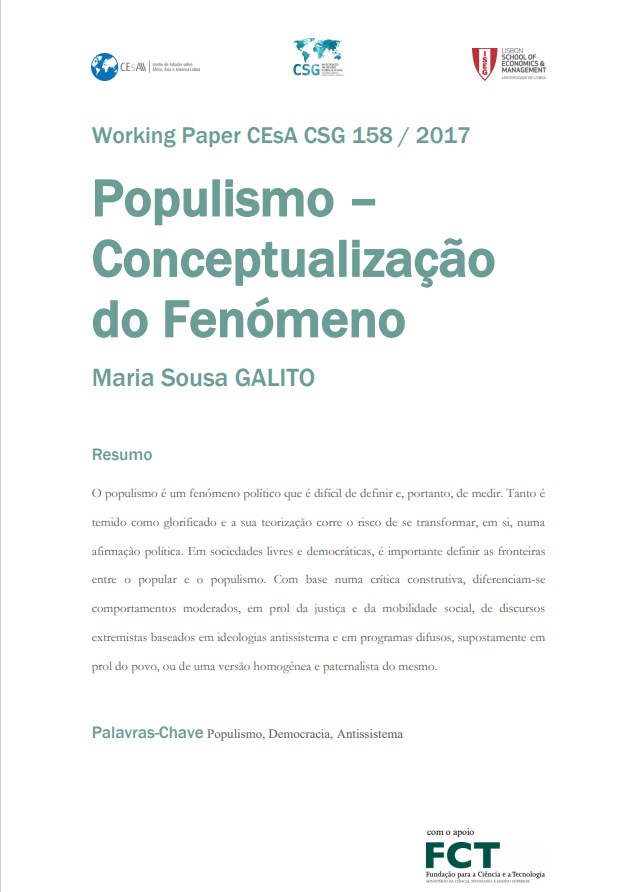
Working Paper 158/2017: Populismo: conceptualização do fenómeno
Abstract:
Populism is a political phenomenon that is difficult to define and, therefore, to measure. It is both feared and glorified, and its theorization risks becoming a political statement in itself. In free and democratic societies, it is important to define the boundaries between popular and populism. On the basis of constructive criticism, moderate behavior, in favor of justice and social mobility, can be distinguished from extremist discourses based on anti-system ideologies and diffuse programs supposedly in favor of the people, or a homogeneous and paternalistic version of them. Populismo: conceptualização do fenómeno is divided into four chapters. The first on the concepts of populism. The second is concerned with the types of populism. The third contextualizes the topic, taking into consideration emotions and the media that project them. The fourth seeks to measure the phenomenon. Therefore, the text seeks to define populism and identifies the lack of consensus around its conceptualization. In an attempt to explain why, it subdivides the various manifestations of it, without forgetting to identify forms of manipulation of the masses, direct or indirect, before proposing ways to measure it and advancing with the main conclusions of the research.
Quotation:
Galito, Maria Sousa (2017). “Populismo: conceptualização do fenómeno”. Instituto Superior de Economia e Gestão – CEsA/ CSG – Documentos de Trabalho nº 158/ 2017.
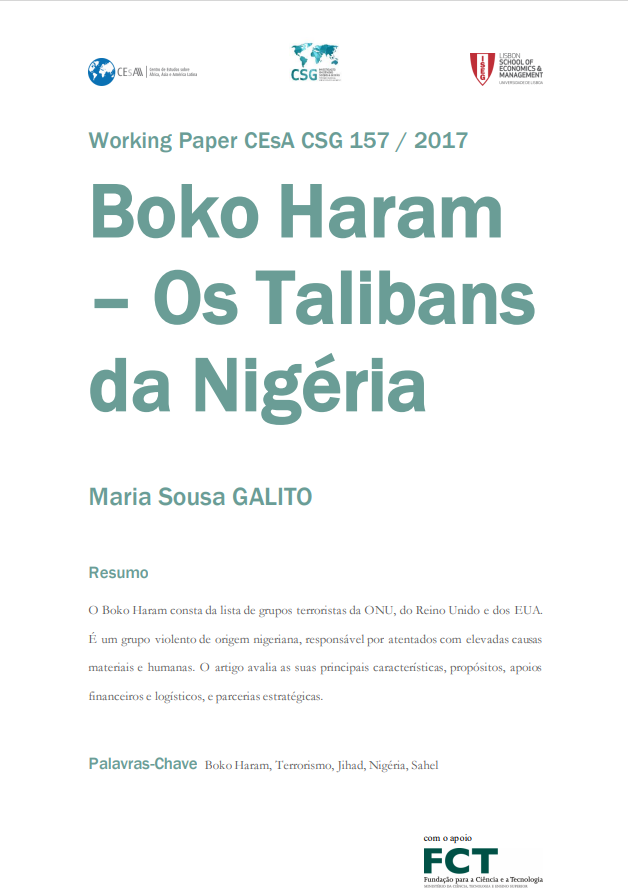
Working Paper 157/2017: Boko Haram – Os talibans da Nigéria
Resumo:
Boko Haram is on the UN, UK, and US list of terrorist groups. It is a violent group of Nigerian origin, responsible for attacks with high material and human toll, officially titled Jama’atul Alhul Sunnah Lidda’wati wal Jihad for “people committed to the propagation of the teachings of the Prophet [Muhammad] and jihad”. Boko Haram – Os Talibans da Nigéria assesses their main characteristics, purposes, financial and logistical support, and strategic partnerships. The research paper focuses its attention on Boko Haram, an internationally known terrorist group that perpetuates regular attacks in Nigeria but also in neighboring countries such as Cameroon. The text is divided into three chapters. The first tries to explain the origins of the phenomenon. The second analyzes the available statistics, relating to different historical periods. The third explains the context in which it operates, in Nigeria and beyond, and the type of partnerships it establishes. The topic is considered to be current and worrisome. Different secondary sources were consulted in order to get an overview of the subject under discussion; since this is a short essay, it was not possible to evaluate the subject exhaustively.
Citação:
Galito, Maria Sousa (2017). “Boko Haram – Os Talibans da Nigéria”. Instituto Superior de Economia e Gestão – CEsA/CSG – Documentos de Trabalho nº 157/2017
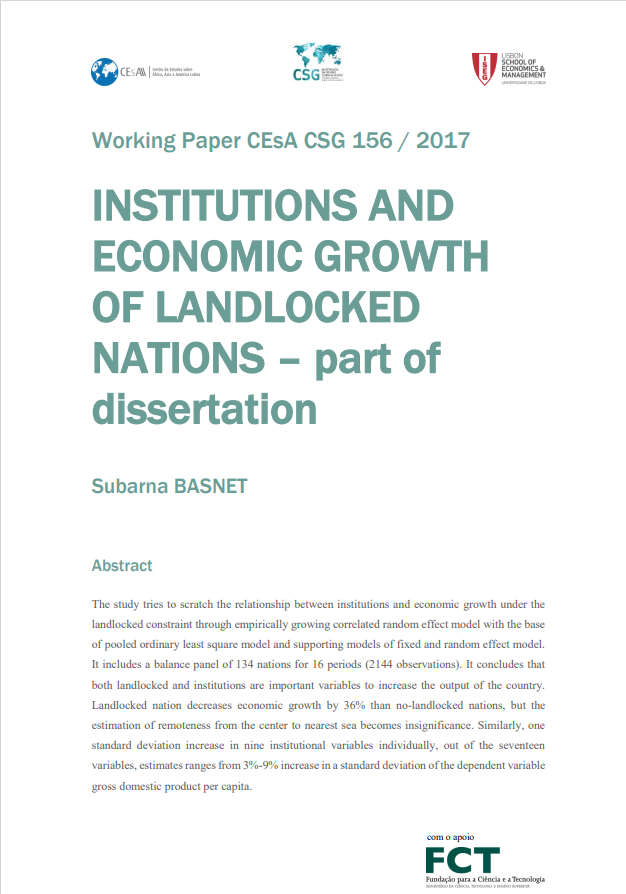
Working Paper 156/2017: Institutions and economic growth of landlocked nations – part of dissertation
Abstract:
Although the impact of economic growth is not absolutely debate-free because of the inequality, economic growth is generally accepted as an economic barometer that indicates the direction of a country’s prosperity. The sustainable higher growth rate over the long periods will have positive multiplier effect throughout the development1 of the country. It will take off from the path of low income country to the middle income country and the middle income to the high income country. Historically, the frontier (USA economy) has raised its per capita income by nearly 17 fold from $ 3000 to more than $ 50000 during the period of 1870 to 2014 (about 150 years) because of an average 2% sustainable economic growth, (Jones 2015). Similarly, Hong Kong, South Korea, Singapore and Taiwan are known as four Asian Dragons from their high growth rates (above an average 7%) between 60’s and 90’s. Japan become world’s second largest economy between 1978-2010 from its post war economic miracle of growth rate 10% in the 1960’s , 5% in the 1970’s and 4% in the 1980’s. In Europe, the republic of Ireland is known as Celtic tiger due to its rapid growth rate (average 5.9%) between years 1995 to 2008. China becomes the second largest country after the year 2010 due to its 30 years of growth rate of average 10% in between 1978-2007. India will be the future economic powerhouse and known as new India due to its continuous higher economic growth rate average 8.2 % from 2006-2011. All these episodes say that the sustainable compounded economic growth makes countries shifting from lower step of development ladder towards the upper steps of development ladder or it helps towards convergence of poor economies to frontier. Interestingly, it is deducing the pace of convergence for the newly growing economies than the past pace of frontier. Institutions and economic growth of landlocked nations – part of dissertation tries to scratch the relationship between institutions and economic growth under the landlocked constraint through empirically growing correlated random effect model with the base of pooled ordinary least square model and supporting models of fixed and random effect model. It includes a balance panel of 134 nations for 16 periods (2144 observations). It concludes that both landlocked and institutions are important variables to increase the output of the country. Landlocked nation decreases economic growth by 36% than no-landlocked nations, but the estimation of remoteness from the center to nearest sea becomes insignificance. Similarly, one standard deviation increase in nine institutional variables individually, out of the seventeen variables, estimates ranges from 3%-9% increase in a standard deviation of the dependent variable gross domestic product per capita.
Quotation:
Basnet, Subarna (2017). “Institutions and economic growth of landlocked nations – part of dissertation”. Instituto Superior de Economia e Gestão – CEsA/ CSG – Documentos de Trabalho nº 156/2017.
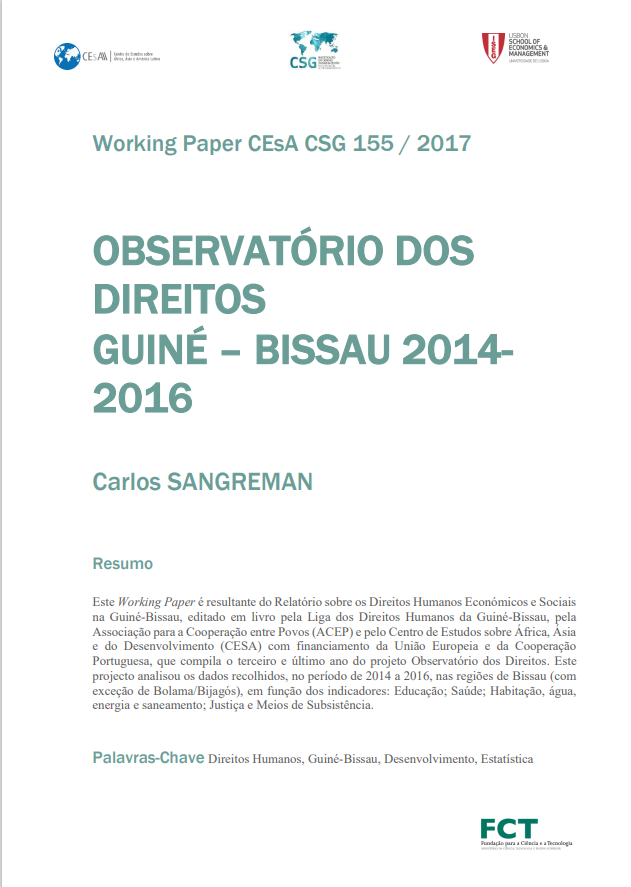
Working Paper 155/2017: Observatório dos direitos Guiné-Bissau 2014-2016
Abstract:
Observatório dos direitos Guiné-Bissau 2014-2016 is the result of the Report on Economic and Social Human Rights in Guinea-Bissau, published in book form by the League of Human Rights of Guinea-Bissau, the Association for Cooperation between Peoples (ACEP) and the Center for African Studies, Asia and Development (CESA) with funding from the European Union and Portuguese Cooperation, which compiles the third and final year of the Observatório dos Direitos project. This project analyzed the data collected, from 2014 to 2016, in the regions of Bissau (with the exception of Bolama/Bijagós), according to the indicators: Education; Health; Housing, water, energy and sanitation; Justice and Livelihoods. This Working Paper is the result of the Report on Economic and Social Human Rights in Guinea-Bissau, published as a book by the Guinea-Bissau Human Rights League, the Association for Cooperation among Peoples between Peoples (ACEP) and the Center for African, Asian and Developmental Studies (CESA) with funding from the financed by the European Union and Portuguese Cooperation. The HD that can be analyzed from the indicators and indicators and the information collected and processed on some aspects of education, health, housing, water energy, sanitation, justice, and means of subsistence (food). You cannot draw from these indicators analysis on aspects that are not included in their calculation.
Quotation:
Sangreman, Carlos (2017). “Observatório dos direitos Guiné-Bissau 2014-2016”. Instituto Superior de Economia e Gestão – CEsA /CSG – Documentos de Trabalho nº 155/2017.
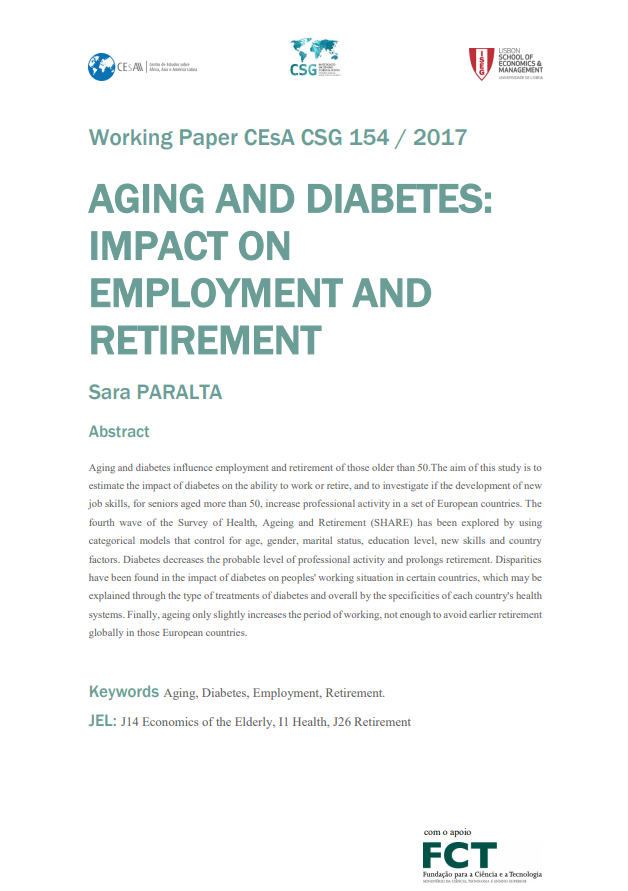
Working Paper 154/2017: Aging and diabetes: impact on employment and retirement
Abstract:
Aging and diabetes influence employment and retirement of those older than 50.The aim of this study is to estimate the impact of diabetes on the ability to work or retire, and to investigate if the development of new job skills, for seniors aged more than 50, increase professional activity in a set of European countries. The fourth wave of the Survey of Health, Ageing and Retirement (SHARE) has been explored by using categorical models that control for age, gender, marital status, education level, new skills and country factors. Diabetes decreases the probable level of professional activity and prolongs retirement. Disparities have been found in the impact of diabetes on peoples’ working situation in certain countries, which may be explained through the type of treatments of diabetes and overall by the specificities of each country’s health systems. Finally, ageing only slightly increases the period of working, not enough to avoid earlier retirement globally in those European countries. The impact of diabetes on professional activity is negative in a set of European Countries included in the inquiry without considering the specific effects of each country. Health problems related with diabetes are causing great economic challenges not only in companies but also in the economy overall. Further investments in education for development new skills and appropriate health treatments of diabetes enhance professional activity. Therefore, those investments are key steps to promote conditions towards active aging and entrepreneurship in senior age.
Quotation:
Paralta, Sara (2017). “Aging and diabetes: impact on employment and retirement”. Instituto Superior de Economia e Gestão – CEsA/ CSG –Documentos de Trabalho nº 154/2017.





